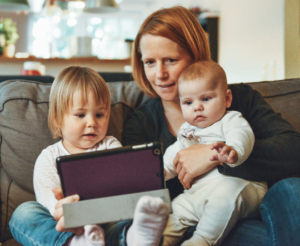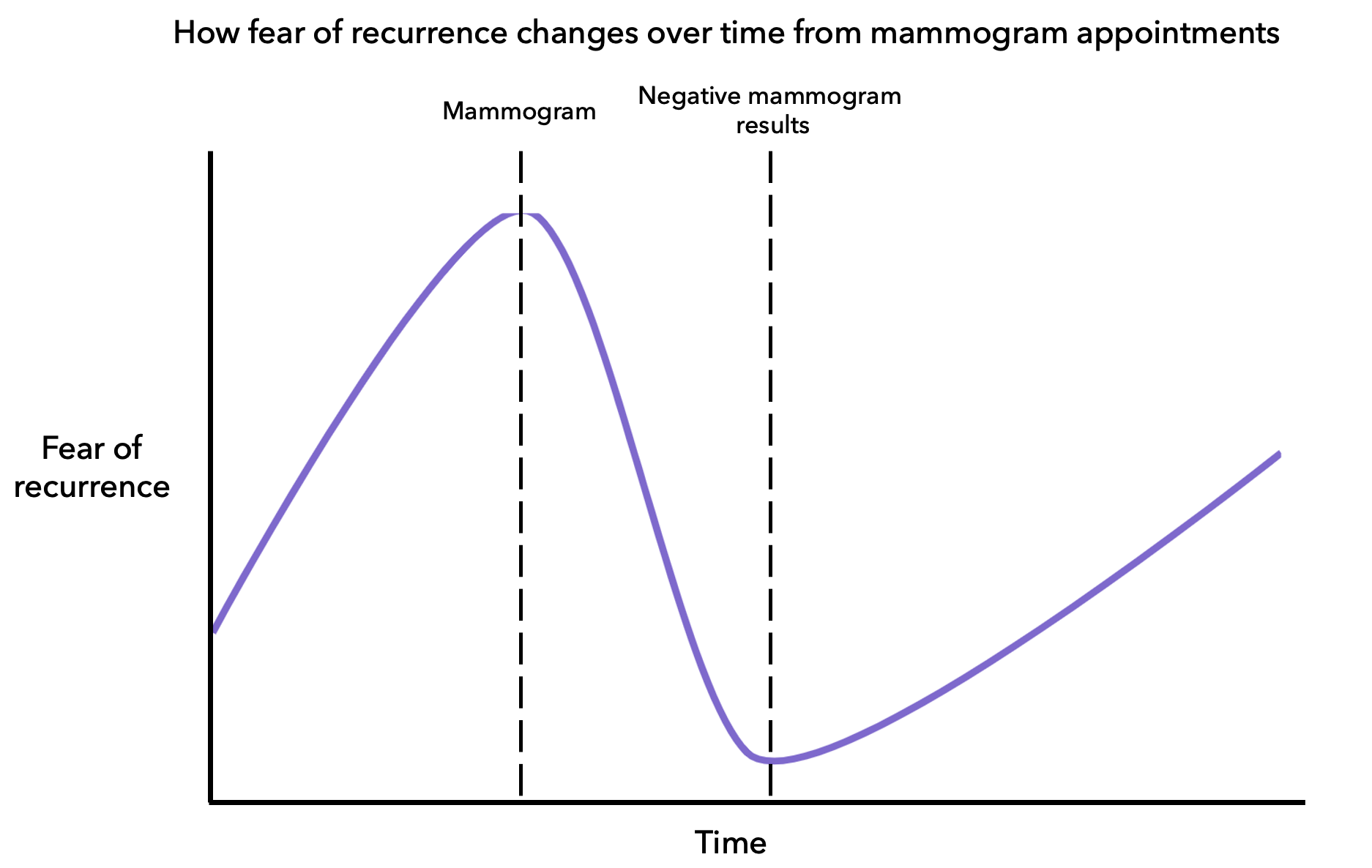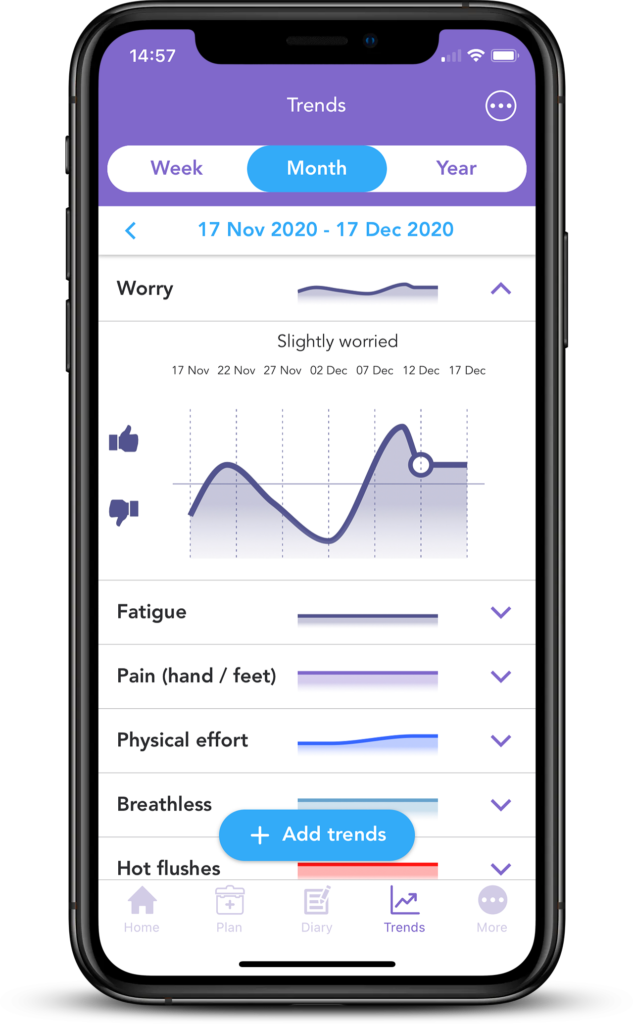
Fear of breast cancer recurrence is one of the most central topics cancer survivors talk about. How do you live with the idea of “I’m done with active treatment, but what happens next?”. After completing treatment, people have time to reflect on what has happened and consider the future. For many, this is the first time that uncomfortable thoughts and a sense of unease or worry about the possibility of cancer recurrence start to emerge. In fact, a lot of people talk about waiting for the other shoe to drop or waiting for something to come because the unthinkable has already happened.
“Fear of recurrence is very common in breast cancer survivors. Half of all survivors experience some fear, but in 20-50%, the fear is clinically significant and profoundly affects their lives” (Dr Ashton, psychologist from the Cleveland Clinic’s Breast Center)1
What is the fear of cancer recurrence and how common is it?
Fear of cancer recurrence can be defined as: “Fear, worry or concern relating to the possibility that cancer will come back or progress” 2. However, there is not one single definition nor a standard way to measure this fear. Therefore, the estimation of how many breast cancer survivors experience moderate to high levels of fear ranges from 22% to 87% 3,4,5.
 Feelings of uncertainty and wondering about the future are present in most cancer survivors. Feelings of physical vulnerability, sense of loss about the future, worry about your life, about your family’s life…are all extremely normal after finishing treatment, and they should be accepted. Those who have gone through cancer treatment describe the first few months as a time of change. However, it’s not only about “getting back to normal”, but it is also about finding out what’s normal for you now. People often say that life has a new meaning or that they look at things differently.
Feelings of uncertainty and wondering about the future are present in most cancer survivors. Feelings of physical vulnerability, sense of loss about the future, worry about your life, about your family’s life…are all extremely normal after finishing treatment, and they should be accepted. Those who have gone through cancer treatment describe the first few months as a time of change. However, it’s not only about “getting back to normal”, but it is also about finding out what’s normal for you now. People often say that life has a new meaning or that they look at things differently.
Most breast cancer survivors find there is a lot of uncertainty ahead of them and encounter psychosocial issues along the way such as anxiety, depression, post-traumatic stress, financial concerns, or returning to work challenges. For example, it is common to feel some level of distress triggered by a scan appointment or small elements such as the smell of the paper towels in the hospital’s bathroom6.
However, fear of cancer recurrence is not just anxiety or feeling afraid, it is more complicated than that. Some of the factors that indicate that a cancer survivor might need external help are2,3,4,5:
- High levels of worry;
- Intrusive thoughts that you cannot control;
- Excessive distress (e.g. discomfort and suffering);
- Difficulties making future plans;
- Not being able to cope; and
- Struggling to manage day-to-day tasks and activities.
Why are some people more prone to experience high levels of fear of breast cancer recurrence?
 According to several studies, people diagnosed with breast cancer at a younger age (18-45 years old) tend to have higher levels of fear of cancer recurrence than older people (55-70 years old)7,8. Some studies found that experiencing this fear was associated with factors such as a higher frequency of unscheduled visits to the GP, higher frequency of breast self-examination, not having mammograms, ultrasounds or other forms of cancer screening in the past year8. Other studies have found that mothers, regardless of their ages or the ages of their children, experience greater fear of cancer recurrence and intrusiveness thoughts into their intimate life 9,10 .
According to several studies, people diagnosed with breast cancer at a younger age (18-45 years old) tend to have higher levels of fear of cancer recurrence than older people (55-70 years old)7,8. Some studies found that experiencing this fear was associated with factors such as a higher frequency of unscheduled visits to the GP, higher frequency of breast self-examination, not having mammograms, ultrasounds or other forms of cancer screening in the past year8. Other studies have found that mothers, regardless of their ages or the ages of their children, experience greater fear of cancer recurrence and intrusiveness thoughts into their intimate life 9,10 .
“Fear of cancer recurrence varies quite a lot over the course of treatment. This variation revolves around factors such as having physical sensations, visits to the doctor and other environmental triggers. These include seeing adverts about cancer, having a future family date or hearing about someone else’s diagnosis” (Professor Gerald Humphris, University of St Andrews)
Other factors that increase the probability of reporting high levels of fear of cancer recurrence include people who had prior recurrence and people who are experiencing physical symptoms11. The latter is especially common as physical symptoms are triggers to most people; they can cause any underlying fear to rise to the surface. Other factors include having family or individual struggles12, a history of depression and anxiety13, and few social contacts14. Lastly, some studies have reported that breast cancer survivors who attribute the cause of their cancer to elements that cannot be changed like family history or environment experience higher levels of fear of cancer recurrence15.
How does the fear of recurrence change over time?
Some studies have indicated that fear of breast cancer recurrence changes over time. One study observed in Stage 0-IIIA breast cancer survivors that fear was higher before having a mammogram, decreased immediately following the receipt of negative mammography results and increased during the month following the mammogram16. However, recent studies have found that this fear is prevalent and persistent over time, even five years after diagnosis 17,18.
“Fear of cancer recurrence trajectories vary from person to person. The fear of some patients gradually reduces over time, the further they are from their original diagnosis” (Professor Gerald Humphris, University of St Andrews).

“However, some patients indicate that as time goes on, they feel more at threat. They do not dare to consider that they are completely free from the possibility of cancer returning. They may see this as a protective strategy, so that they are not hit as hard emotionally if the cancer does come back” (Professor Gerald Humphris, University of St Andrews).
How can the family react to this fear of cancer recurrence?
Sometimes there is this “tyranny of silence” in which family members want to protect each other and not say they are frightened. This tendency can cause a separation within the family rather than coming together. It is normal to find it scary to talk about cancer coming back or cancer itself. However, the more that families can find a way, to be honest about how they feel, the less burden they will carry overall19. Starting this conversation can be difficult. Remember if this is the case for you, external help like counselling can be a good option20.
How to manage the fear of cancer recurrence?
There are some ways to find relief from uncertainty and worry. Here we have put together a list of them, but please note that this does not mean you have to try everything. Unfortunately, the hard thing of learning how to cope with fear, worry and uncertainty is figuring out what element or elements are causing your fear of cancer recurrence and what you can do about them.
If you are very worried about the risk of recurrence, you may want to ask your doctor or nurse questions like these6 :

- Is it possible that cancer can come back?
- When is it more likely to come back?
- Where would it be more likely to come back?
- How likely is it to come back? (numbers and statistics)
- Is there anything I can do to keep it from coming back?
- How will I know if it’s back? For this question, ABC diagnosis has created useful infographics to know what to look for.
Did you know that the OWise app has a question list function in which you can enter these questions and more, so you don’t forget anything when you go to your next appointment?
Paying attention to your emotions is key21. Acknowledge your fears and pay attention to how you are feeling. Make sure you get help with emotional stress. Do you often feel overwhelmed or find emotions interfering with your life?
- Family and friends can be your biggest supporters, don’t be afraid of talking to them.
- Find a support group. Some good sites to find support groups are Maggie’s, Future Dreams, Breast Cancer Now.
- If you are having high fear of cancer recurrence, please let your doctor know. The NHS offers up to 6 to 12 sessions of cognitive-behavioural therapy. Also, you might want to consider long-term psychotherapy sessions.
Tracking your worry levels over time with the OWise app can help you acknowledge how you are feeling. As well as this, it may help you to pinpoint the factors that may be contributing to changing worry levels.
 Take care of your body21 :
Take care of your body21 :
- Eat a healthy diet
- Fit exercise into your day. A walk around your neighbourhood counts!
- Get enough sleep
- Follow up with your medical appointments (check-ups, GP, etc.)
Trying self-talk. This technique does not resonate with everybody, but for some people, it can be extremely useful. The idea is to try to provide yourself reassurance when you are experiencing fear with sentences like22 :
- “It is unlikely that this is cancer”
- “I was screened x months ago, and things were fine”
- “If I experience this in two weeks I will go to the doctor”.
- “I can always go to the doctor sooner if I need reassurance”
- “There are millions of cancer survivors, I am one of them”
Take breaks, it is good to get distracted, do something for yourself:
- Exercise
- Social activities with friends and family
- Meditation
- Television/films
- Work
- Pleasurable reading
For more information on how to move forward after active treatment, head to our previous blog.
We hope that you now better understand the fear of breast cancer recurrence, how to manage it and that you can feel confident to express yourself with your care team, family and friends. Our aim is to make sure you are kept informed so make sure to follow our Instagram and Twitter accounts for any updates.
References
- Consult QD. 2018. Fear of recurrence common among breast cancer survivors [online] Available at: https://consultqd.clevelandclinic.org/fear-of-recurrence-common-among-breast-cancer-survivors/
- Lebel, S., Ozakinci, G., Humphris, G., Mutsaers, B., Thewes, B., Pris, J., Dinkel, A., Butow, P. 2016. From normal response to clinical problem: definition and clinical features of fear of cancer recurrence. Support Care Cancer, 24(8):pp.3265-3268.
- Simard, S., Thewes, B., Humphris, G., Dixon, M., Hayde, C., Mireskandari, S., Ozakinci. 2013. Fear of cancer recurrence in adult cancer survivors: a systematic review of quantitative studies. Journal of Cancer survivorship: research and practice, 7(3): pp.300-322.
- Mehnert, A., Berg, P., Henrich, G., Herschbach, P. 2009. Fear of cancer progression and cancer-related intrusive cognition in breast cancer survivors. Psycho-Oncology, 18(12): pp.1273-1280.
- Ellegaard, M., Grau, C., Zachariae, R., Jensen, A. 2016. Fear of cancer recurrence and unmet needs among breast cancer survivors in the first five years. A cross-sectional study. Acta Oncologica, 56(2): pp.314-320.
- National Coalition for Cancer Survivorship. 2018. NCCN Webinar Video: “Understanding Fear of Cancer Recurrence” [online] Available at: https://canceradvocacy.org/nccs-webinar-video-understanding-fear-of-cancer-recurrence/
- Ziner, K., Sledge, G., Bell, C., Johns, S., Miller, K., Champion, V. 2012. Predicting fear of breast cancer recurrence and self-efficacy in survivors by age at diagnosis. Oncology Nursing Forum, 38(2): 287-295.
- Thewes, B., Butow, P., Bell, M., Beith, J., Stuart-Harris, R., Grossi, M., Capp, A., Dalley, D., FCR Study Advisory Committee. 2012. Fear of cancer recurrence in young women with a history of early-stage breast cancer: a cross-sectional study for prevalence and association with health behaviours. Supportive Cancer in Care, 20: pp.2651-2659.
- Lebel, S., Beattie, S., Ares, I., Bielajew, C. 2013. Young and worried: Age and fear of recurrence in breast cancer survivors. Health Psychology, 32(6), pp. 695-705.
- Ares, I., Lebel, S., Bielajew, C. 2014. The impact of motherhood on perceived stress, illness intrusiveness and fear of cancer recurrence in young breast cancer survivors over time. Psychology and Health, 29(9), pp. 651-670.
- Clayton, M., Mishel, M., Belyea, M. 2006. Testing a model of symptoms, communication, uncertainty, and wellbeing in older breast cancer survivors. Research in Nursing and Health. 29(1), pp-18-39.
- Mellon, S., Kershaw, T., Northouse, L., Freeman‐Gibb, L. 2007. A family based model to predict fear of recurrence for cancer survivors and caregivers. Psycho-onconol
- Sun, H., Yang, Y., Zhang, J., Liu, T., Wang, H., Garg, S., Zhang, B. 2019. Fear of cancer recurrence, anxiety and depressive symptoms in adolescent and young adults cancer patients. Neuropsychiatr Dis Treat, 15, pp. 857–865.
- Thornton, L., Levin, A., Dorfman, C., Godiwala, N. 2014. Emotions and social relationships for breast and gynecologic patients: A qualitative study of coping recurrence. Pychoncology. 23(4).
- Dumalaon-Cararia, J., Prichard, I., Hutchinson, A., Wilson, C. 2018. Fear of cancer recurrence and psychological well-being in women with breast cancer: The role of causal cancer attributions and optimism. Eur J Cancer Care (Engl). 27(1).
- McGinty, H. L., Small, B. J., Laronga, C., Jacobsen, P. B. 2016. Predictors and patterns of fear of cancer recurrence in breast cancer survivors. Health Psychology, 35(1), pp. 1–9.
- Vandraas, K., Reinertsen, K., Kiserud, C., Lie, H. 2020. Fear of cancer recurrence among young adult cancer survivors- exploring long-term contributing factors in a large, population-based cohort. Journal of Cancer Survivorship.19
- Savard, J., Ivers, H. 2013. The evolution of feat of cancer recurrence during the cancer care trajectory and its relationship with cancer characteristics. Journal of Psychosomatic Research. 74(4), pp-354-360.
- Soriano, E., Pasipanodya, E., LoSavio, S., Otto, A., Perndorfer, S., Laurenceau, J. 2018. Social Constaints and fear of Recurrence in Couples Coping with Early-Stage Breast Cancer. Health Psychology, 37(9), pp-874:884.
- Dana-Farber Cancer Institute. 2010. How to Manage Fear of Cancer Recurrence- Dana-Farber Cancer Institute. [online] Available at: https://www.youtube.com/watch?v=xlYUytWtlK8&ab_channel=Dana-FarberCancerInstitute
- Mayo Clinic. 2020. Cancer survivors: Managing your emotions after cancer treatment. [online] Available at: https://www.mayoclinic.org/diseases-conditions/cancer/in-depth/cancer-survivor/art-20047129
- Coscarelli, A. 2009. When Cancer exists in the mind. [online] Available at: https://www.simmsmanncenter.ucla.edu/resources/articles-from-the-founding-director/when-cancer-exists-in-the-mind/
